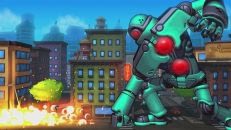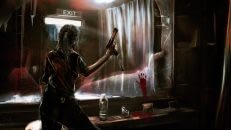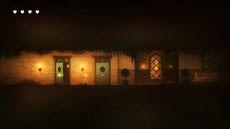Another Perspective Review – Bleak, Mad, and Intelligent
Another Perspective is one of those puzzle games that left me staring at the ceiling while lying my bed at night, running myself through the last puzzle that stumped me until I shut it off. Being able to swap between two different characters that sit in two different versions of the same room should not be as hard as it is, but developer Shaun Spalding has created several levels of vicious challenge through simplicity. Only one character can move while the other becomes a stepping stone wherever you left him, and its up to intelligent players to guide him to the door. Are you smart enough, or will you spend your precious few hours of sleep mulling over the solutions to the game’s puzzles?
A comparison to Braid is unavoidable, as the game has a similar look and feel. At first glance, you can really see the inspirations in the smooth animation of the cartoon-like character. There’s just something about the way his hair and body moves, as well as his general appearance, that reminded me of that game. The visual similarities end quickly, though, as while Braid was very light and cheerful in its own way, Another Perspective is dark and bleak. The endless, twisting tunnels of the world are grey and oppressing, lit up by a dull glow around the character. A dingy cloud hangs around the environment, leaving everything hazy and uncomfortable. The places looks depressing, and despite the main character’s lighthearted comments to himself, the place does seem to press in on the player as you progress.
The story behind the game is told only through snippets of dialogue from the character, and while he says some funny things at times to break the somber mood, you can see this place beginning to wear on him. He has no idea why he is here, or why he has developed the power to switch places with stone copies of himself, bringing them to life. Still, what is he switching? When you left the last room, were you the original or were you the copy? It’s not long before the endlessly repeating series of doors and the constant switching have him begging to know where he is and what he’s doing, a subtle madness slipping into the narrative that crashes against the happy, cartoon-like look of the character sprite. I felt sorry pushing this man further and further into this awful place.
The music doesn’t make it feel much more comfortable, either. The tone is very somber, with quiet, eerie music playing in the background of the levels. It’s not a Silent Hill level of discomfort, but many of the tunes focus on a sense of foreboding and depression, strengthening the oppressive feeling of the place. It really makes the occasional jokes from the protagonist that much more welcome, as they are a welcome break from the game’s strong atmosphere. Still, between the look of the game and its music, it’s hard to feel anything but a crushing, creeping sadness in the works as you play it.
The power to switch bodies is what makes the game unique, and allows for its devious puzzles. Like I said, you can change places with stone versions of yourself, leaving your old body as a statue wherever you chose to make the switch. Each body sees a different version of the stage you’re in, though, so while one body might see a key that’s just out of reach, switching to the other body might put up a wall that makes it impossible for him to get. You have to look at both characters and the different rooms they’re in, working with two stages and two characters to get through them. Characters switched in mid-air will remain there, though, and using that knowledge, you can figure out every one of the game’s solutions.
Theoretically, anyway. Another Perspective may have a simple mechanic at work, but it has been used to challenging effect. I was having a hard time with the game within a few screens, stuck trying to figure out where to jump to in order to get my character up to a high platform. You can only jump about one full character height of yourself, so standing on your own head and switching places with yourself won’t work no matter how bad you want it to (I wanted it. Really bad.). So, instead, you have to look at the very specific layout of each stage and figure ways to move each character around to get through. Or more than one character, at times, as the game gives you multiple copies in some of the stages. Or ones that fall upward instead of down, requiring very specific timing and planning.
It doesn’t seem like all that much to keep track of, but thinking about using multiple characters and their jumps and trajectories over two different stages can make the simplest-looking room take a long time to figure out. In theory, if you were a super genius you could finish this game quickly, making it seem like it’s quite short. Being able to juggle all of this stuff on an initial playthrough can make this game last for some time, though, so your puzzle-solving ability will directly affect how long you get to enjoy it. Still, there’s also the game’s extra Mystery Mode, which contains harder puzzles for people who felt like the game was too easy or over too quickly. If you somehow found the main game too easy, these challenges should last you a little while. Or tie you up for the rest of your life.
The game may draw inspirations from Braid, but it really is its own beast with unique puzzle-solving elements and a dark atmosphere. There is something that’s subtly horrible about leaving these living statues of yourself behind that dulls the normal joy I felt at solving a hard puzzle. It’s very bleak, with occasional moments of laughter coming from the funny, uncomfortable comments the main character makes. For what it is, Another Perspective is interesting and a great mental workout, and the eerie atmosphere gives it a unique personality in the puzzle platformer market.
Another Perspective is available for $4.99 on Steam.





